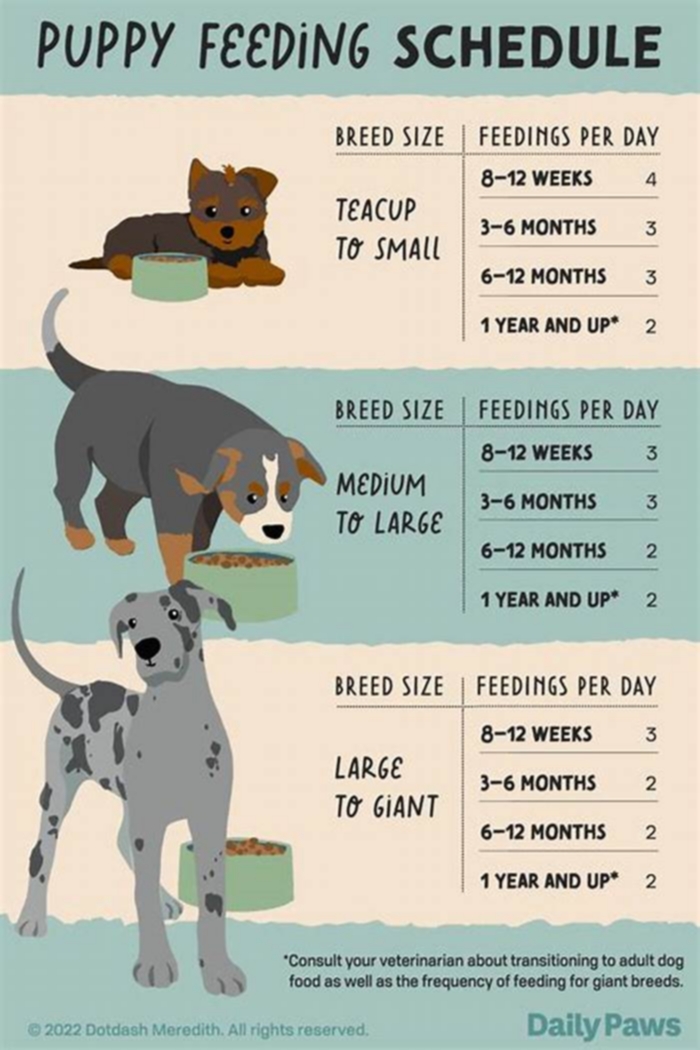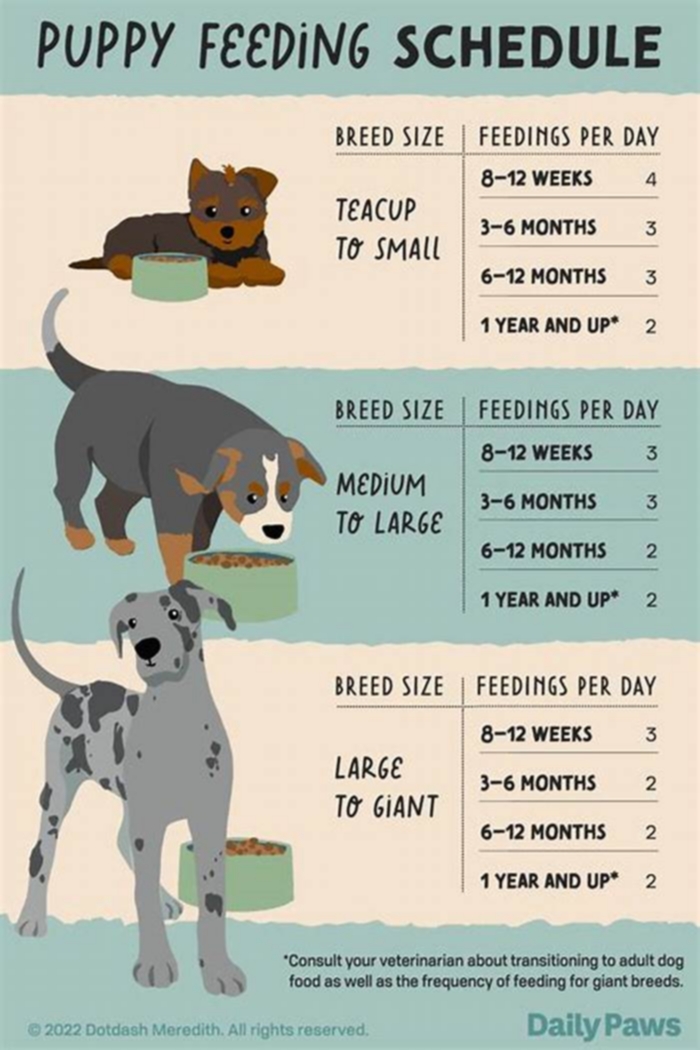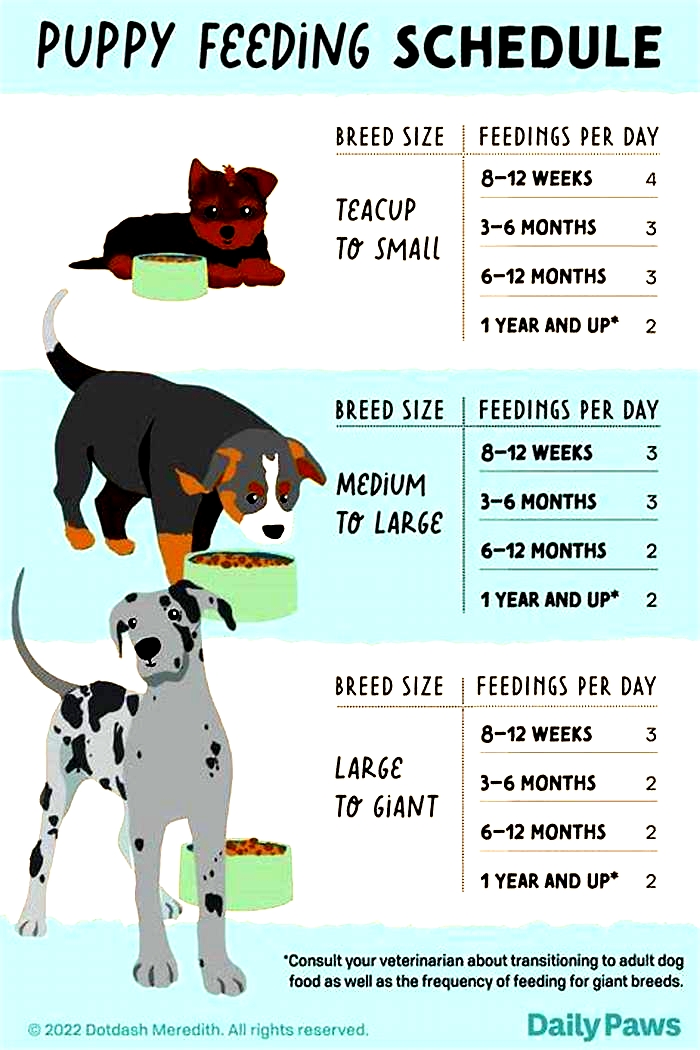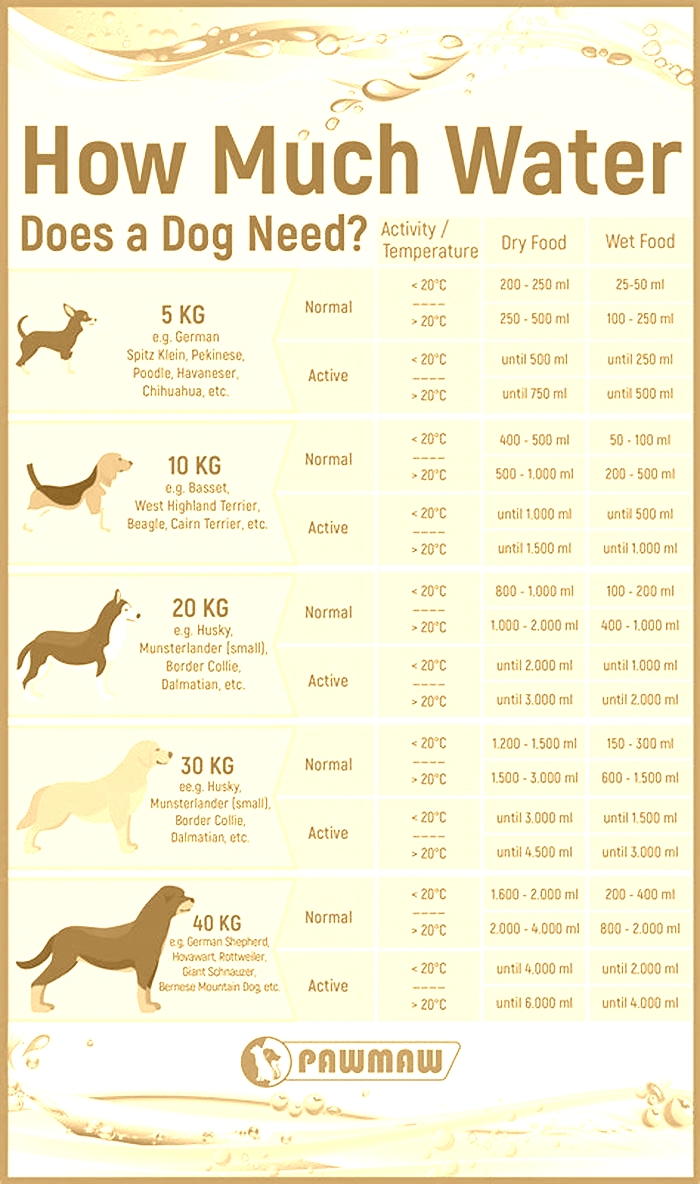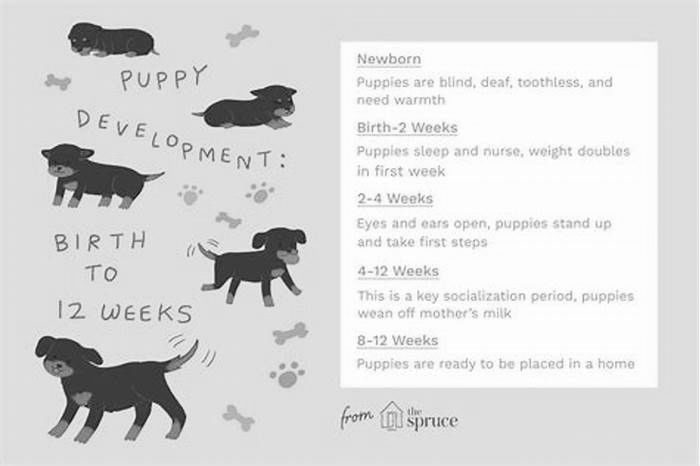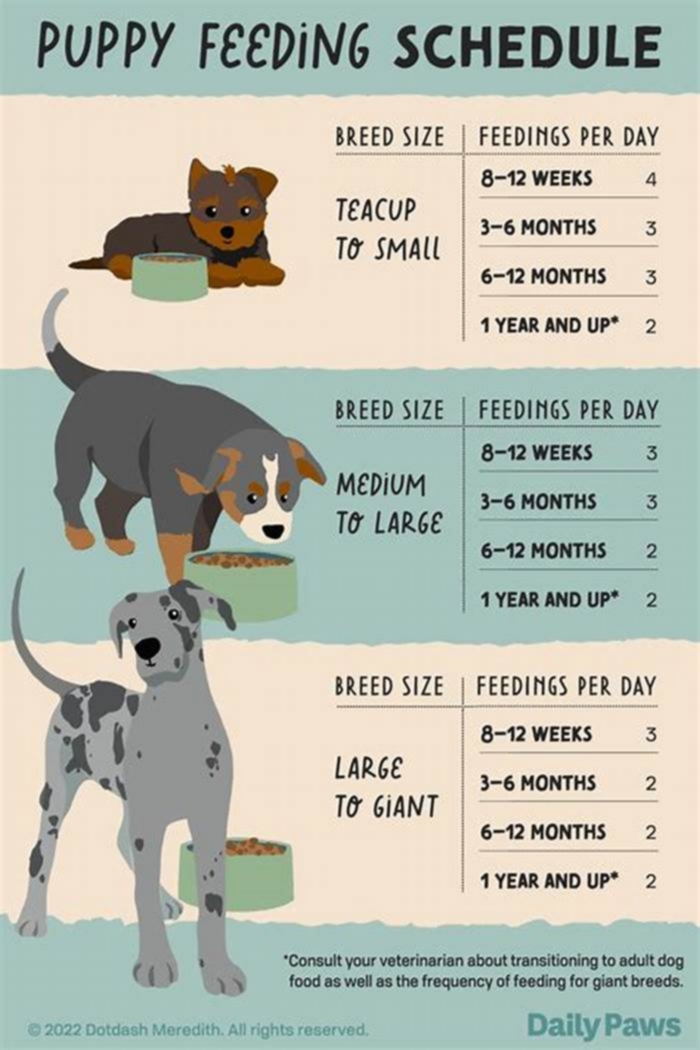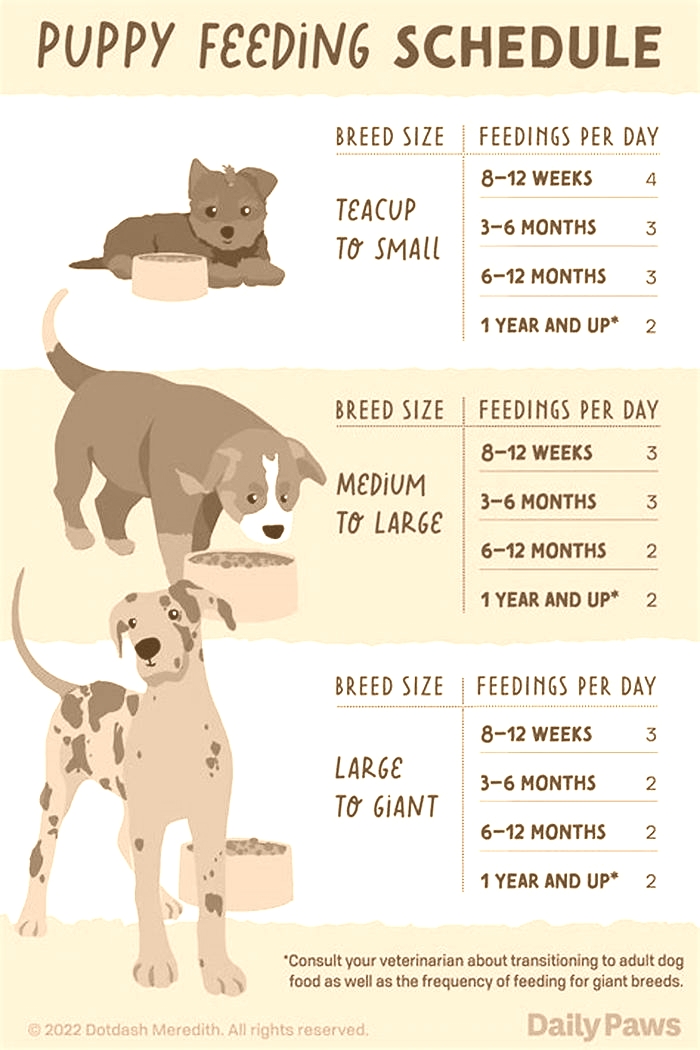Can 4 week old puppies eat wet food
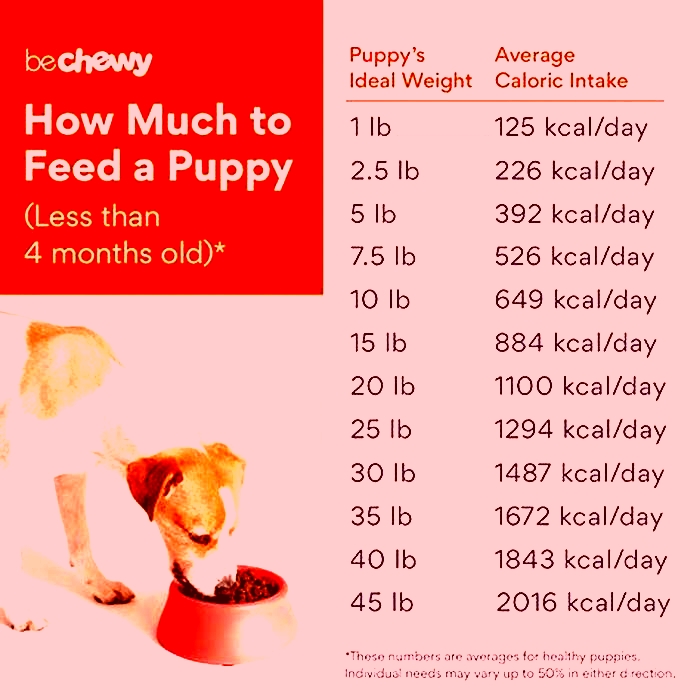
Can Puppies Eat Soft Food at 4 Weeks?
Feeding your little four-legged companion the right foods at the appropriate times will help her get the nutrients she needs, continue to grow and stay healthy. If done properly, the transition from milk to soft food to dry puppy food should go quite smoothly.
First Months Diet
For the first 3 to 4 weeks, a puppy should eat an exclusive diet of mothers milk. If the mother isnt producing enough milk for some reason or youre dealing with an orphaned puppy, she should be fed a milk replacement formula up to that point.
Soft Food
Soft food generally is introduced into a puppys diet around the 3- to 4-week mark, although milk still is a main part of her diet. The soft food you offer the puppy can be canned soft food or dry puppy food that has been soaked with water or milk replacement formula to make a gruel-like texture. When the soft food is offered, she may not know what to do with it at first. The first few attempts may end up more on her coat and the ground than in her tummy, but she will learn quickly enough how to eat it. Practice makes perfect.
Weaning
Between the third or fourth week to the seventh or eighth weeks, the puppy will start to eat more puppy food and less milk. The mother naturally will start to wean the puppies from her milk by standing up during a feeding and walking away from a feeding puppy or just nudging the puppy away with her nose. The puppy quickly learns that it can eat what mommy is eating or it will just be hungry. An empty tummy is a good motivator to seek other food. If you are weaning the orphaned pup or mother hasn't started it by the end of the fourth week, start to separate the puppy from her mother for a couple hours and placing her in a warm, draft-free area. Place a shallow pie pan with a bit of soft, high-quality puppy food in the area. Let her nose around and explore for a while. When youre ready, wash the soft food from her coat with a slightly damp washcloth, if she got messy, and place her back with her mommy and litter mates, or in her regular area.
Transitioning from Soft to Dry Food
Around the seventh week, you should start transitioning from soft to dry puppy food. Over the course of that week, progressively replace some of the soft food with dry food. By the end of the eighth week, this transition should be complete and she should be fed exclusively high-quality dry puppy food. She should be fed three to four times a day up until she is 6 months old. Then reduce it to twice daily feedings.
When Can Puppies Eat Wet Food? Vet Approved Facts & FAQ
The information is current and up-to-date in accordance with the latest veterinarian research.
Learn moreWhat food your dog eats will largely depend on their age. So, its crucial to provide your puppy with a high-quality diet as they get older, since they grow quickly at this time and its vital they get all the nutrients they need to thrive.
Depending on their breed, puppies can start eating wet food as early as 8 weeks old or a mixture of wet and dry food.

What Is Wet Dog Food?
The amount of water in food is the primary distinction between wet and dry foods. Wet food has between 60% and 84% moisture, while dry food contains between 3% and 12% moisture. Dry foods are typically packaged in large bags or cardboard boxes, while wet foods are often canned or sealed in pouches.
Wet dog food might be a good option for puppies with poor appetites, as the fragrance and texture are more likely to appeal to them. On the other hand, dry dog food has several benefits in terms of simplicity of storage, cost, and hygiene.
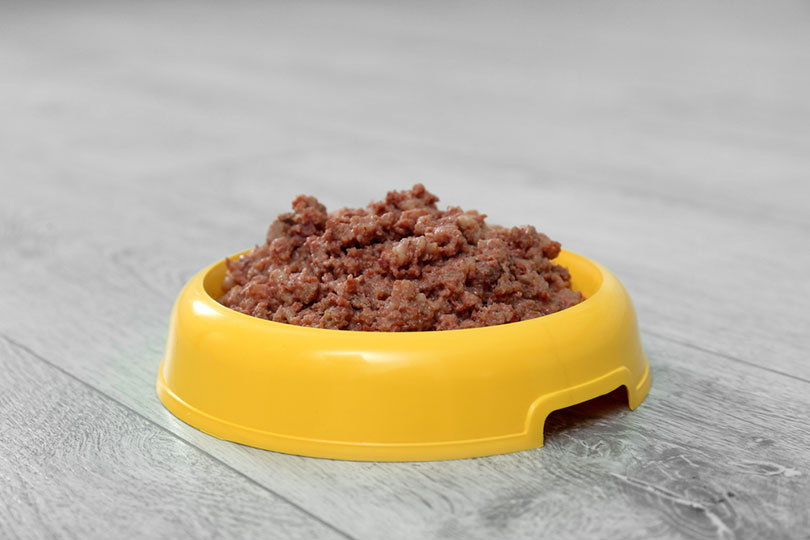
Can My 8-Week-Old Puppy Eat Wet Food?
You can begin giving your puppy wet food when they are 68 weeks old. Puppies at this stage will be weaning and transitioning from mothers milk to solid food. Since a puppys teeth are still developing, this type of food may be a better option. In addition, wet food is ideal for this period since it is frequently more appealing and less complicated for puppies to consume than dry food.
Then, if youd like, you can switch from wet to dry food. When doing this, moistening the kibble with water to make it softer before giving it to your dog may be a good idea for some pups. Additionally, because dogs are often sensitive to abrupt dietary changes, switching should be made gradually, ideally over a 10-day period.

Choosing a Wet Food for Your Puppy
If you would like to give your little pup wet food, picking a complete, balanced and healthy product to support their growth is crucial. The AAFCO label should be on the can and it should state something like for growing puppies or formulated for growth.
Select a wet food designed especially for large breed pups if your pet is one of a large or giant breed. It should say something along the lines of for the growth of large breed puppies on the cans back.
Additionally, you should choose a trustworthy company for your dogs wet food, which can be done with the guidelines provided by the World Small Animal Veterinary Association on choosing pet food or asking your vet for advice.


How Much to Feed Your Puppy
Dog owners frequently wonder what quantity they should feed a puppy. This is a challenging question because the proper portion to feed your canine relies on a variety of individual factors, including the age, weight, breed, and physical state, along with the number of calories in the meal they are now eating and the frequency of their meals.
There isnt a product that works for all puppies due to the numerous variables involved. Instead, the ideal person to ask for advice on the exact quantity of food to give your pup to ensure that they will get the correct number of calories to support healthy development and growth is undoubtedly a vet. You can get a guideline to the amount to feed on the back of packets and tins. But remember they are just that, a guideline, and individuals may vary in their needs.
You can introduce some wet food to your puppys diet as long as they have finished weaning and are currently consuming solid food. Just begin with small amounts and monitor any digestive discomfort that may arise from dietary changes. Wet food is just as healthy for dogs as dry food, so if your pooch enjoys it and tolerates it well, you can give it to puppies safely.

Conclusion
Wet food can be the ideal option to feed your puppy, particularly for young puppies that have just finished the weaning phase. Additionally, it might be the most practical choice for owners since you wouldnt have to mash dry kibble into a sloppy consistency.
In the end, what matters more about dog food than its form is the nutrition and components it contains. Your puppy can develop into a healthy, robust, and happy dog with the help of either wet or dry food (or a combination of the two), as long as the food you select is complete and balanced for their age.
Featured Image Credit: Switlana Sonyashna, Shutterstock
Feeding a Puppy at 4 Weeks: A Complete Guide
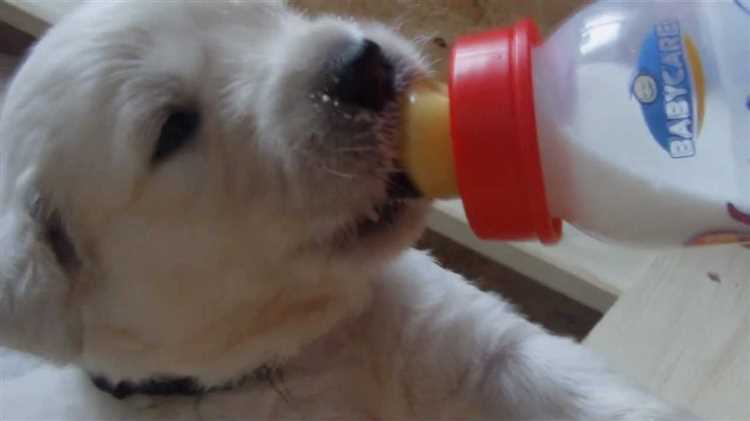
If you have a new puppy, you may be wondering what to feed it at 4 weeks old. At this stage, the puppy is just starting to wean off its mothers milk and requires a diet that provides all the necessary nutrients for proper growth and development.
Transitioning from milk to solid food:
At 4 weeks old, its time to start introducing solid food to the puppys diet. While the mothers milk is still important for nutrition, the puppys teeth are developing, and its crucial to introduce them to solid food slowly. Start by mixing a small amount of high-quality puppy food with warm water or milk replacement formula until it forms a soupy consistency.
Its important to choose a puppy food that is specifically formulated for their nutritional needs at this stage of development. Look for a product that contains a balanced blend of protein, fats, and carbohydrates to support healthy growth.
Feeding frequency and portion size:
Feed the puppy 4-5 small meals a day, gradually reducing the amount of water or milk replacement formula added to the food. As the puppy grows, you can gradually decrease the frequency of feedings and increase the portion size.
Monitor the puppys weight and adjust the portion size accordingly to ensure they are getting the right amount of food for their size and age.
Additional tips:
As the puppy starts to eat solid food, make sure they always have access to fresh water. Clean their food and water bowls regularly to prevent any bacterial contamination. Also, supervise meal times and remove any uneaten food after about 20 minutes to prevent spoilage.
Remember that each puppy is unique, and their nutritional needs may vary. Its always best to consult with a veterinarian for personalized guidance on what to feed your specific puppy.
By following these guidelines and providing a balanced diet, you can ensure that your 4-week-old puppy gets the nutrition it needs for a healthy start in life.
Four Weeks Old Puppy Feeding Guide
When your puppy reaches four weeks of age, its time to start introducing solid food into their diet. While they will still be nursing from their mother, introducing solid food gradually will help them transition to a solid food diet as they grow older.
Choose the Right Food
At four weeks old, your puppys teeth will start to come in, but they will still be small and sensitive. Its important to choose a puppy food that is specifically designed for their needs. Look for a high-quality puppy food that is formulated to support their growth and development.
Introduce Soft Food
Start by mixing a small amount of the puppy food with warm water or puppy formula to create a soft, gruel-like consistency. Allow the food to soak for a few minutes until it becomes soft and easy for your puppy to eat. Gradually increase the amount of solid food and decrease the liquid as your puppy becomes more comfortable with the texture.
Feed Small, Frequent Meals
At four weeks old, your puppys stomach is still small, so its important to feed them small, frequent meals throughout the day. Aim for four to six meals per day, spaced out every three to four hours. This will ensure that your puppy is getting the nutrients they need without overloading their digestive system.
Monitor Your Puppys Progress
As you introduce solid food, keep an eye on your puppys weight and overall health. If you notice any changes in their appetite, energy levels, or consistency of their stools, consult your veterinarian. They can provide guidance on adjusting your puppys diet if necessary.
Continue Nursing
While your puppy is learning to eat solid food, they will still rely on nursing from their mother for essential nutrients and antibodies. Its essential to continue allowing them access to their mothers milk for as long as possible, ideally up to eight weeks of age.
Remember, each puppy is unique, and their nutritional needs may vary slightly. Consulting with your veterinarian is always the best way to ensure that your puppy is receiving the proper nutrition for their age and development.
Importance of Proper Nutrition for a Four Week Old Puppy
A puppy at four weeks of age is at a crucial stage of development and requires proper nutrition to support healthy growth and development. During this stage, puppies are transitioning from nursing to solid food and their nutritional needs are changing rapidly.
Proper nutrition is essential for a four week old puppy to ensure they receive the necessary nutrients for optimal health. A well-balanced diet helps support their growing bodies and provides them with the energy they need to explore and play.
At this stage, it is important to provide the puppy with a diet that is rich in essential nutrients such as protein, fats, carbohydrates, vitamins, and minerals. Protein is crucial for muscle development, while fats provide energy and support brain development. Carbohydrates serve as a source of additional energy, and vitamins and minerals help support overall health and proper bodily functions.
It is recommended to feed a four week old puppy a diet specially formulated for their age and nutritional requirements. This may include a combination of puppy formula, wet dog food, and puppy kibble. It is important to choose high-quality, easily digestible options that are appropriate for their sensitive digestive systems.
Feeding the puppy small, frequent meals throughout the day is recommended to prevent overeating and digestive issues. Additionally, it is important to provide clean, fresh water at all times to keep the puppy hydrated.
Proper nutrition plays a critical role in the overall health and development of a four week old puppy. By providing a well-balanced diet, you are setting them on the path to a healthy and happy life.
Feeding a puppy at 4 weeks with the right type of food is crucial for their healthy growth and development. At this stage, their bodies are rapidly developing, and they require proper nutrition to support their growing bones, muscles, and organs. A balanced diet rich in essential nutrients is essential to promote proper physical and mental development.
One key nutrient that plays a vital role in a puppys growth is protein. Protein is necessary for building and repairing tissues, forming enzymes and hormones, and supporting a strong immune system. Good sources of protein for puppies include lean meats, fish, eggs, and high-quality dog food specifically formulated for puppies.
Another important nutrient for a growing puppy is fat. Fat provides them with the necessary energy to support their active lifestyle and helps in the absorption of fat-soluble vitamins. However, it is essential to provide healthy sources of fats such as omega-3 fatty acids found in fish oil or flaxseed oil. Avoid excessive amounts of saturated fats that can lead to health issues in the long run.
Carbohydrates are also an important part of a puppys diet as they provide energy for their daily activities. Choose complex carbohydrates like whole grains, fruits, and vegetables over simple sugars to ensure steady and sustained energy levels. This will help prevent energy spikes and crashes, keeping your puppy active and healthy.
Vitamins and minerals are crucial for a puppys overall health and development. These micronutrients help support their immune system, aid in bone development, and ensure the proper functioning of various organs. A balanced puppy food or a diet that includes a variety of nutrient-rich foods like vegetables, fruits, and whole grains will help provide these essential vitamins and minerals.
Water is often overlooked, but it is essential for a puppys growth and development. Make sure your puppy always has access to clean and fresh water throughout the day. Water helps with digestion, nutrient absorption, and temperature regulation, ensuring your puppy stays hydrated and healthy.
In conclusion, providing your 4-week-old puppy with a diet that promotes healthy growth and development is crucial. Ensure a balanced diet rich in protein, healthy fats, carbohydrates, vitamins, minerals, and plenty of water. This will set the foundation for a healthy and active life for your furry friend.
Strengthens Immune System
Feeding a puppy at 4 weeks is crucial for strengthening their immune system. At this age, puppies are still developing their immune system, and proper nutrition plays a vital role in supporting its growth.
A well-balanced diet rich in essential nutrients, vitamins, and minerals helps boost a puppys immune system. It provides the necessary building blocks for the body to create antibodies, which fight off infections and diseases.
When choosing food for a 4-week-old puppy, it is essential to opt for high-quality, commercially prepared puppy food. These foods are specifically formulated to meet the nutritional needs of growing puppies.
Additionally, including probiotics in a puppys diet can also strengthen their immune system. Probiotics are beneficial bacteria that promote a healthy gut, aiding in better digestion and absorption of nutrients. A healthy gut is crucial for a robust immune system as a significant portion of the immune system resides in the digestive tract.
Moreover, it is important to maintain proper hygiene and a clean environment for the puppy. Regularly cleaning their living area, washing their food and water bowls, and ensuring they have access to clean water at all times helps prevent the growth of harmful bacteria and other pathogens that could weaken their immune system.
| Key Tips to Strengthen the Immune System: |
|---|
| 1. Feed high-quality, commercially prepared puppy food. |
| 2. Include probiotics in the diet. |
| 3. Maintain proper hygiene and a clean environment. |
| 4. Provide clean water at all times. |
Feeding Schedule for a Four Week Old Puppy
At four weeks old, a puppy is starting to transition from nursing to eating solid food. Its important to establish a regular feeding schedule to ensure the proper development and growth of your puppy.
At this stage, the puppy should be introduced to a soft puppy food or a puppy formula mixed with water. The food should be in a wet, mushy texture that is easy for the puppy to consume. Begin by offering small amounts of food four to six times a day.
Here is a sample feeding schedule for a four-week-old puppy:
7:00 am: Start the day with a small meal of wet puppy food or puppy formula mixed with water. Offer about a quarter of a cup or enough to fill the puppys stomach without overfeeding.
10:00 am: Offer another small meal of wet puppy food or formula. The puppy should be hungry again by this time, but still, keep the portion size small to avoid upsetting the puppys delicate stomach.
1:00 pm: Its time for the third meal of the day. Again, offer a small portion of wet puppy food or formula. By spacing the meals three hours apart, you can ensure that the puppys tummy is consistently being nourished throughout the day.
4:00 pm: Another feeding time! At this stage, the puppy may start showing more interest in solid food and might even try to eat from a bowl. Continue providing small portions of wet food or formula mixed with water.
7:00 pm: As the day winds down, offer the puppy another small meal. By this time, the puppy should be becoming familiar with the routine and eagerly anticipating mealtime.
10:00 pm: Before the puppy goes to sleep for the night, offer one final small meal. This will help keep the puppys energy levels stable throughout the night.
Remember to monitor your puppys weight and overall growth during this period. If there are any concerns or issues, consult with a veterinarian for advice.
As the puppy grows, their feeding schedule will change. Its important to gradually transition them to regular puppy food and adjust the feeding times accordingly. By providing a consistent feeding schedule, you are setting the foundation for a healthy and well-nourished puppy.
Variety of Nutritious Options
When it comes to feeding a puppy at 4 weeks old, it is important to provide a variety of nutritious options to support their growth and development. At this age, puppies are transitioning from their mothers milk to solid food, so it is essential to introduce them to a range of flavors and textures.
One option is to offer a high-quality puppy kibble that is specifically formulated for their nutritional needs. Look for a brand that includes essential nutrients such as protein, fat, carbohydrates, vitamins, and minerals. It is also important to choose a kibble size that is appropriate for their small mouths.
In addition to kibble, you can also introduce wet food to their diet. Wet food is a great option as it provides added moisture to keep them hydrated, and it often has a more appealing taste and smell for picky eaters. Look for wet food that is labeled as suitable for puppies and provides a balanced diet.
Another nutritious option to consider is incorporating raw or homemade food into their diet. This can include raw meat, fruits, vegetables, and even cooked grains. However, it is important to consult with a veterinarian or a professional nutritionist to ensure that you are providing a balanced and complete diet.
Remember to always monitor your puppys reaction to new foods and introduce them slowly to prevent any digestive issues. Be mindful of their individual dietary needs and consult with a professional if you have any concerns.
Overall, providing a variety of nutritious options during this important stage of their development will help set them up for a healthy and happy life.
Small, Frequent Meals
At 4 weeks old, a puppys stomach is still small and developing, so it is important to provide them with small, frequent meals throughout the day. This helps prevent their stomach from getting overloaded and ensures they receive the necessary nutrients for proper growth and development.
When feeding a puppy at 4 weeks, you can start introducing solid food in addition to their mothers milk or formula. However, it is crucial to choose the right type of food that is appropriate for their age and size. Wet or dry puppy food that is specially formulated for their nutritional needs is ideal.
When offering solid food, you can begin by mixing a small amount of the puppy food with warm water or milk substitute to create a gruel-like consistency. This makes it easier for the puppy to consume and digest. Gradually decrease the amount of liquid added as the puppy becomes more comfortable with eating solid food.
It is recommended to feed the puppy 4 to 6 times a day, spaced evenly throughout the day. This ensures they are receiving a sufficient amount of food but in smaller portions. Offering meals at regular intervals also helps establish a routine for the puppy, making it easier for them to adapt to a feeding schedule as they grow older.
Monitor your puppys appetite and adjust the amount of food accordingly. As they grow, their portions may increase, but it is essential to avoid overfeeding or underfeeding. Consult with your veterinarian to determine the appropriate portion sizes and to ensure your puppys nutritional needs are being met.
- Provide fresh water in a shallow dish at all times
- Always supervise the puppy during meal times
- Avoid giving them table scraps or human food, as it can be harmful to their health
- Stick to a consistent feeding schedule to establish good eating habits
- Be patient and understanding as the puppy learns to eat solid food
Remember, each puppy is unique, and their nutritional needs may vary. It is always best to consult with a veterinarian for personalized advice and guidance on feeding your puppy at 4 weeks old.
Question-answer:
What should I feed my puppy when he is 4 weeks old?
When your puppy is 4 weeks old, you can start introducing solid food. You can feed him a mixture of puppy milk replacer and a high-quality, wet puppy food that is specially formulated for his age. You can offer the food in a shallow dish and let him explore and lick it up. Make sure to soften the food with warm water to make it easier for him to eat.
Can I start feeding my puppy dry food at 4 weeks?
At 4 weeks old, it is not recommended to feed your puppy solely dry food. Their teeth are still developing, and they may have a hard time chewing on dry kibble. It is best to start with a mixture of wet food and puppy milk replacer. As your puppy grows older and his teeth start to come in, you can gradually introduce dry food into his diet.
How often should I feed my puppy at 4 weeks?
At 4 weeks old, you should feed your puppy small, frequent meals. A good feeding schedule would be to offer him food 4-5 times a day. You can start with smaller portions and gradually increase the amount as he grows. It is important to provide regular and consistent meals to support his growth and development.
Can I give my puppy treats at 4 weeks?
At 4 weeks old, it is not necessary to give your puppy treats. His main source of nutrition should come from his regular meals. However, you can use small pieces of softened puppy food as a reward during training sessions or to encourage him to eat his regular food. Just make sure to monitor his overall food intake and not overfeed him.
What are some signs that my puppy is not tolerating his food well at 4 weeks?
If your puppy is not tolerating his food well at 4 weeks, you may notice signs such as diarrhea, vomiting, or a decrease in appetite. It is important to monitor his digestion and overall health. If you notice any concerning symptoms, it is best to consult with a veterinarian. They can provide guidance and recommend any necessary dietary adjustments or medical treatment for your puppy.

